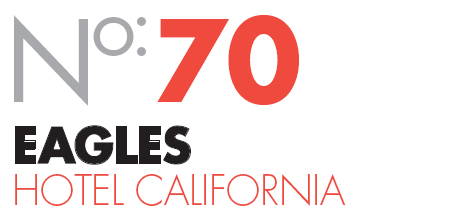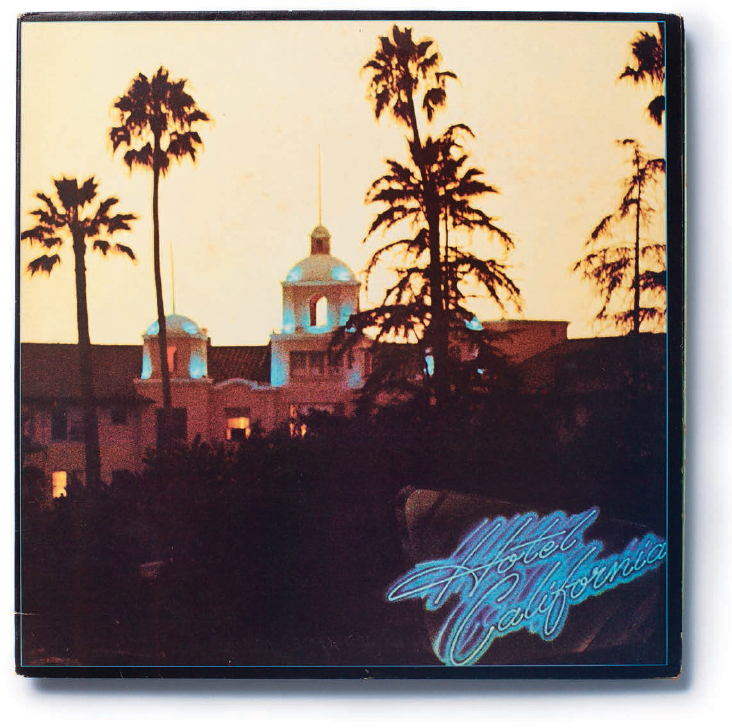
Asylum
Produced by Bill Szymczyk
Released: December 1976
TRACKLISTING
01 Hotel California
02 New Kid in Town
03 Life in the Fast Lane
04 Wasted Time
05 Wasted Time (Reprise)
06 Victim of Love
07 Pretty Maids All in a Row
08 Try and Love Again
09 The Last Resort
It didn’t start out to be a concept album but it became one after all,’ said Don Henley just days after the release of Hotel California. No record captured the spiritual decline of America better than this Eagles album.
The Eagles started out in the early ’70s as cosmic cowboys; their second album Desperado had been the first rock horse opera. However, the two prime movers in the band – Glenn Frey and Don Henley – were cowboys only as much as Brian Wilson was a surfer. Quite at home in Los Angeles, they hung with literate songwriters like Jackson Browne and tapped into the zeitgeist of the time which was, one way or another, decadence. Frey and Henley had an ear for hooks and they had built the Eagles into one of the biggest bands in America. By March 1976, when they began to record their fifth album, original guitarist Bernie Leadon, who was responsible for much of their country sound, had been replaced by Midwestern rocker Joe Walsh. Walsh also brought a synthesiser while, according to Glenn Frey, additional guitarist Don Felder brought the rock & roll.
The Eagles may have had a song called ‘Peaceful Easy Feeling’ but life in the quintet was never that. Henley, Walsh and Frey were all alpha males whose brutality to each other was amplified by massive amounts of cocaine and the excess for which the ’70s was noted. One track Felder brought to the equation was an instrumental called ‘Mexican Reggae’ which describes the feel. Henley and Frey grabbed it and spun a tale of a fictional hotel, where ‘you can check out, but you can never leave’.

‘I meant it to be a symbolic piece about America in general, which is a land of excess,’ said Henley. ‘Lyrically the song deals with classical themes of conflict: darkness and light, good and evil, youth and age, the spiritual versus the secular. I guess you could say it’s a song about loss of innocence.’ This trip to the dark side was set against a roiling guitar duel between Walsh and Felder – one of the most tense guitar workouts in rock.
If the title track defines the album, ‘Wasted Time’, ‘The Last Resort’ and ‘Life in the Fast Lane’ reinforce it. In fact, a coke dealer suggested the latter title to Frey as they sped along the freeway.
Sessions for the album began in March 1976 and were mostly done at Criteria in Miami but the group, who were notoriously perfectionist in the studio, dragged the process out until October, interspersed with touring in the US. The Eagles were out to make a big statement and would not rush anything. The reference point for this album was not musical but literary – the books by Raymond Chandler and Nathanael West’s novel The Day of the Locust, which had portrayed LA as a metaphor for the spiritual corruption of old America. Now greed on one hand and cocaine on the other was eating the soul of a new generation. Ironically, the Eagles became the very thing that ‘Hotel California’ critiqued.
‘It’s the Bicentennial Year, and this is our Bicentennial statement,’ Henley told journalist Chris Charlesworth. ‘It’s about the demise of the ’60s and the decadence and escapism we are experiencing in the ’70s. It’s also about the kind of limbo we’re experiencing in the music business while we’re waiting for the next big surge of inspiration, like the Beatles or whatever.’
Glenn Frey added: ‘We think that this album represents the whole world, not just California, as something elegant which has been corrupted’.